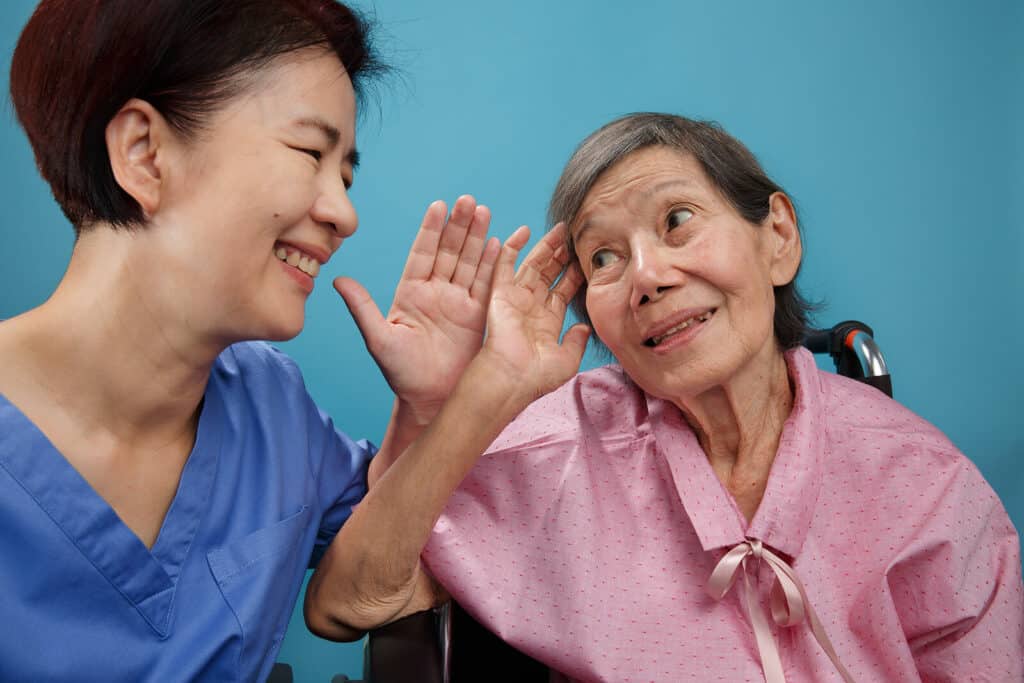With nearly 1 in 6 people having some degree of hearing loss, you may have a loved one or co-worker with impaired hearing. Having conversations can be tough when people have hearing loss, even with the support of treatments like hearing aids. But there are important ways you can provide support. There are several strategies you can practice to accommodate your loved ones with hearing loss. The following strategies can support their hearing needs, make conversations and spaces more accessible, as well as facilitate effective communication.
- Reduce background noise. We navigate varying levels of background noise everyday. But background noise can present specific challenges for people with hearing loss. It provides additional noise for the brain to have to process and filter through. This creates additional labor when the brain is already working hard to process sound signals. So reducing background noise as much as possible is helpful. There are several ways you can do this including: minimizing volume settings on any music or TV playing in the background, powering off any noisy appliances that are not in use, rolling windows up to cut down on environmental noise, avoiding spaces that are busier and noisier like restaurants during peak hours etc.
- Avoid multitasking. It is common to multitask during conversations – cooking, cleaning, texting etc. But these activities can be really distracting while engaging with a loved one who has hearing loss. It can produce more background noise, making it harder to hear. Multitasking can also block visibility which is important to maintain throughout a conversation – more on this soon. You want to make sure you are fully present and engaged, this helps you communicate more effectively as well as catch any challenges they may be experiencing throughout the conversation.
- Practice helpful communication strategies. There are several communication strategies we encourage you to practice to make conversations easier to navigate. This includes:
- Grab your loved one’s attention before speaking. You can do this by saying their name or tapping them on the shoulder.
- Avoid starting a conversation from a different room and when you are engaging in other activities.
- Rephrase rather than repeat. Sometimes, people can struggle with specific sounds so using a new set of words is more useful and gives greater opportunity for them to process what you are saying.
- Do not shout but rather, speak naturally, taking natural pauses throughout the conversation.
- Maintain visibility by facing them while talking.
In addition to these strategies, be sure to check-in throughout the conversation. Ask if
there are any adjustments you can make and if you can clarify anything.
- Emphasize nonverbal cues. Nonverbal cues are another way we communicate, understand what others are expressing, and follow a conversation. This is especially useful for people with hearing loss who can use nonverbal cues to help follow a conversation. This includes facial expressions, hand gestures, and other body movements. We encourage you to emphasize nonverbal cues and also provide access to these cues. You can do this by maintaining visibility, making sure there is nothing obstructing your loved one’s view of you throughout a conversation. Avoid covering your mouth or engaging in other activities that interfere with nonverbal cues.
- Maximize technology. Another useful accommodation strategy is maximizing the use of technology to support your loved one’s hearing needs. This includes:
- Applying closed captions while watching a TV show or movie. This allows them to follow along with greater support.
- Discuss hearing aid technologies and accessories. There are a range of features they can invest in to maximize the performance of their hearing aids. This includes Bluetooth connectivity, digital noise reduction, additional mics etc.
Encourage them to talk to their hearing healthcare provider about the technologies and
features that could benefit their hearing on a daily basis.
- Additional Tips. It is important to be patient and understanding. It can take some time to adjust to hearing loss and communicating with hearing aids. Additionally, a few other things you can do are: adjust lighting when needed so that people are more visible, arranging seating intentionally so that your loved one is positioned in a way where they can see everyone else, and discuss other strategies you can practice to support their hearing needs.
Your support is invaluable. Contact us to learn more about how you can accommodate your loved one with hearing loss.





